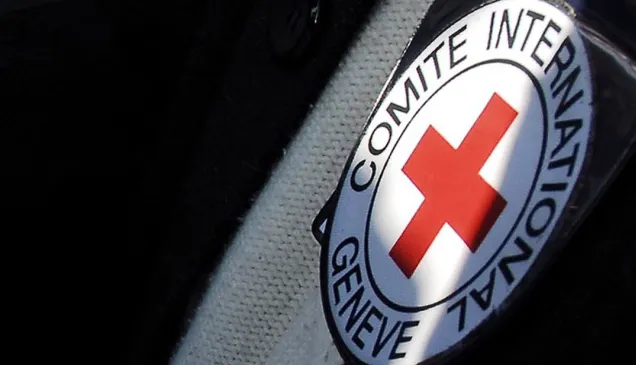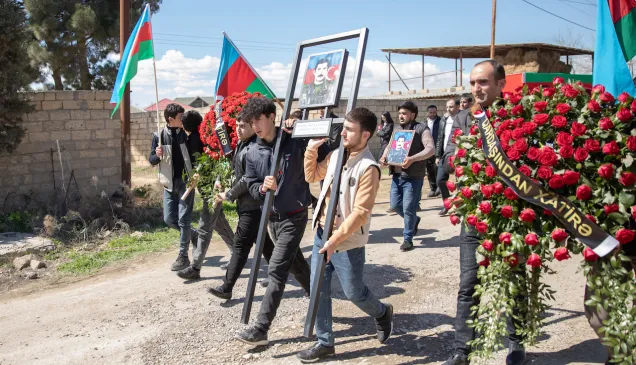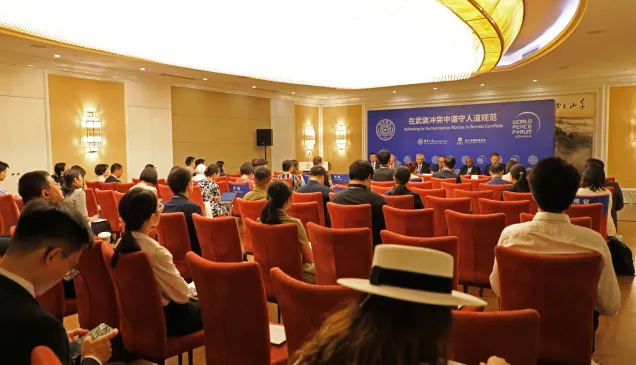Democratic Republic of the Congo: Facts and Figures - July to September 2014
A summary of the ICRC's activities in the Democratic Republic of the Congo between July and September 2014.
The International Committee of the Red Cross (ICRC) is an impartial, neutral and independent organization whose exclusively humanitarian mission is to protect the lives and dignity of victims of armed conflict and other situations of violence, and to provide them with assistance. The ICRC has been in the Democratic Republic of the Congo (DRC) for 36 years. It has a delegation in Kinshasa, sub-delegations in Bukavu, Goma, Kisangani and Lubumbashi, and offices in Beni, Bunia, Dungu, Manono and Uvira.
Preventing violence against civilians
The ICRC continued its efforts to address the humanitarian consequences of armed conflicts and other situations of violence affecting the civilian population in certain regions of the country. To this end, it maintained and stepped up its presence among the people in the affected areas and reinforced its confidential dialogue with State and non-State armed actors. Allegations of violations of international humanitarian law collected by its teams on the ground have led to 36 confidential representations to the various weapons bearers.
Visiting people deprived of their liberty
With a view to promoting humane treatment and conditions of detention that comply with national law and international standards, the ICRC continued its visits to places of detention.
From July to September 2014 the ICRC:
- carried out 54 visits to 16,581 detainees in 29 civilian or military places of detention in the DRC and monitored the cases of 740 of these detainees;
- offered detainees the opportunity to keep in touch with their loved ones thanks to Red Cross messages. 478 messages were collected and 406 delivered;
- continued to provide regular aid to 12 prison pharmacies;
- provided food to an average of 2,711 detainees per month across the country through its nutritional assistance programme;
- completed four drinking-water projects in the prisons of Kinshasa, Bunia, Bukavu and Kolwezi, which hold some 9,400 detainees. Improvements were also made to buildings and sanitary facilities.
Reuniting families separated by conflict
Armed conflict and other situations of violence in the DRC lead to the incessant and repeated displacement of civilians. Family members continue to become separated, at times across borders, and children are among the most vulnerable. In cooperation with the Red Cross Society of the DRC, the ICRC carried on in its efforts to enable members of separated families to renew contact or to be reunited either in the DRC or in a neighbouring country.
From July to September:
- 265 children (including 151 formerly associated with armed forces or armed groups) were reunited with their families in the DRC. The ICRC also repatriated 17 children and reunited them with their relatives in neighbouring countries;
- the ICRC or volunteers of the Red Cross Society of the DRC visited 50 children who were reunited with their families after being associated with armed forces or armed groups in order to monitor their reintegration into their family and community. Depending on their age, they received either a set of school supplies (a schoolbag, stationery and fabric for a uniform) or tools (hoes, shovels and rakes) or other materials to help them forge ties in their community;
- 9,912 Red Cross messages were collected and 8,210 delivered in the DRC;
- at the end of September 2014, 520 children monitored by the ICRC were still waiting to be reunited with their families. They are living in transit centres or with host families in different parts of the country.
In North and South Kivu, the ICRC ran information sessions in the transit centres to help 237 children (including 31 girls) prepare to return home following their association with armed forces or armed groups. The ICRC and the National Society also organized recreational activities for all the children in these communities to promote their integration back into society.
Improving health care
The ICRC continued to provide regular support to three physical rehabilitation centres around the country and to nine health centres and four hospitals that provide primary and secondary health care for the neediest people in North and South Kivu.
In North and South Kivu, the ICRC also:
- evacuated 92 war wounded and 49 sick people from a basic health-care facility to a referral facility. The two ICRC surgical teams that work with the staff of Ndosho Hospital in Goma and the main referral hospital in Bukavu operated on 182 war-wounded civilians and soldiers. On average, each wounded person undergoes two to three successive operations over the course of several weeks;
- provided first-aid training to 45 members of armed forces and groups;
- provided medicines and equipment to 15 hospitals and 11 health centres to deal with medical and surgical emergencies;
- supported 29 counselling centres caring for 1,273 victims of violence (both men and women), especially sexual assault;
- worked with 10 psycho-social counsellors who then resumed their support for victims of violence in Orientale Province;
- provided physical rehabilitation services for 244 war-wounded civilians and soldiers, including fitting artificial limbs and orthotic devices and donating crutches and tricycles.
In addition, from July through September the ICRC:
- sponsored two students to train in orthotics and prosthetics for three years in Lomé, Togo;
- built a basketball court at the Bukavu centre and provided it with 12 wheelchairs specially adapted for handicapped sports;
- teamed up with the South Kivu Ministry of Health to train health-care workers on treating victims of sexual violence and cases of acute malnutrition and on dealing with low-risk maternity.
Meeting basic needs
The ICRC helps families affected by armed conflict to meet their essential needs by maintaining or restoring their means of survival. Aid is provided to the most vulnerable families among them, with a particular focus on those that are displaced or returning to their homes. Volunteers of the National Society take part in aid distributions organized by the ICRC.
From July to September:
- 57,990 people received essential household items in the provinces of North Kivu, South Kivu and Katanga;
- 80,855 people received food in North Kivu and South Kivu;
- 141,200 people received tools and seeds to grow produce and to feed themselves, or were provided with support to repair their fishponds in North and South Kivu and in Katanga.
Providing access to water and improving sanitation
The ICRC works with various specialist organizations like Regideso and the national rural water service as well as with the National Society to make sure people have access to safe drinking water. In rural areas, the ICRC gets local water committees involved in the planning, implementation and maintenance stages.
From July to September:
- in North Kivu, improvements were completed on the system that supplies water to 40,000 people in Mubi;
- in South Kivu, two springs providing water to more than 1,000 people were upgraded;
- in South Kivu, three health-care facilities – in Lwizi, Champundu and Lulingu Hospital – were renovated and improved;
- efforts to improve the flow of water in the city of Goma continued, as two new pumping stations serving 500,000 residents began operating.
Cooperating with the Red Cross Society of the DRC
From July to September:
- the ICRC engaged in preparedness support by providing various emergency-response, first-aid and identification supplies (including body-management kits, first-aid kits and tabards) to the branches of the National Society in North and South Kivu, Orientale, Katanga and Western Kasaï and to the National Society's headquarters. A workshop was also run in Western Kasaï for around twenty National Society members;
- three training-of-trainers sessions in community-based first-aid were run in North and South Kivu and Orientale with the ICRC's financial and technical support. The trainers were given a number of materials, including 30 packs of visuals, 30 vests and 15 bicycles;
- the ICRC provided financial assistance to five branches of the National Society (in North and South Kivu, Orientale, Katanga and Western Kasaï provinces) in support of their ongoing operations.
Promoting international humanitarian law
The ICRC continued its efforts to raise awareness of the provisions of international humanitarian law and of its impartial, neutral and independent humanitarian work.
To this end, from July to September the ICRC met with:
- 3,038 members of the armed and security forces and MONUSCO peacekeeping troops in North and South Kivu, Katanga, Orientale and Kinshasa. The sessions were interactive thanks to the use of diverse pedagogical tools adapted to the local context;
- 74 members of armed groups in South Kivu;
- 3,707 civil society representatives in the eastern part of the country.
In an effort to develop a community of interest for IHL in educational institutions, the ICRC held two information sessions attended by 62 students.



